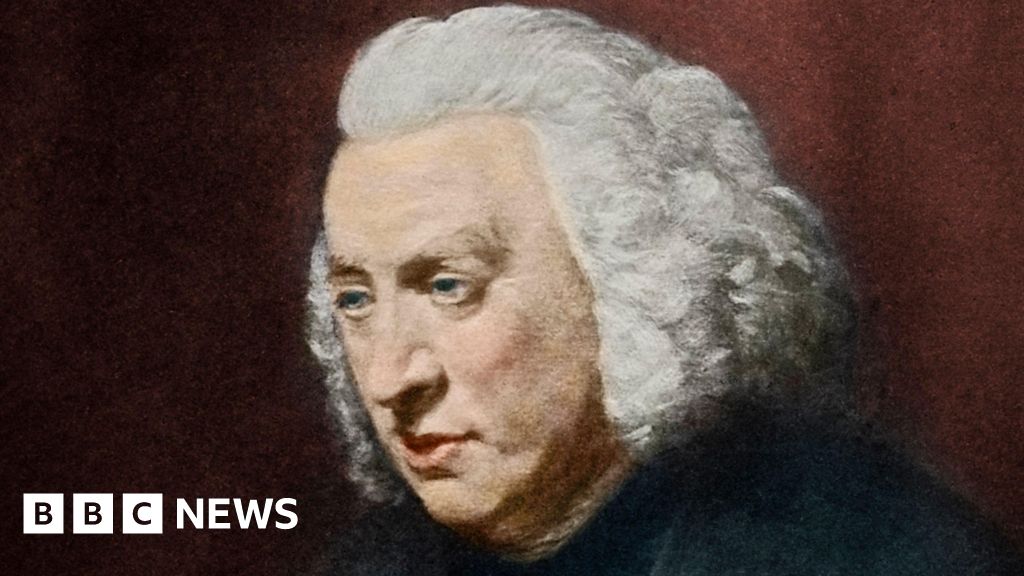- cross-posted to:
- [email protected]
- cross-posted to:
- [email protected]
cross-posted from: https://feddit.uk/post/13419347
The desk of the writer Dr Samuel Johnson is to be returned to his former London home for the first time in more than 260 years.
Except, in a strange twist, its owner is now uncertain whether it really is the desk of the famous 18th Century dictionary author.
It’s been suggested that despite many years of being treated as a literary relic, it could have been part of a Victorian hustle to make money.
…
What’s now in dispute is the fate of the desk on which he wrote the dictionary when he was living in Gough Square, in a house which is now a museum to his memory.
Since the 19th Century the wooden desk has been in Pembroke College Oxford - and the college is lending this prized possession to the Dr Johnson House museum.
But when Lynda Mugglestone, professor of the history of English at the college, began to check out the provenance of the desk, there were some unexpected questions.
“The real story is that we don’t quite know if it’s the real desk,” she says.
It had come to the college through a clergyman who had been close to Dr Johnson’s god daughter, Elizabeth Ann Lowe, and her sister. A plaque was attached to signify its historic importance.
But the puzzle is whether those sisters ever really had the desk or whether they used their literary connection as a way of guilt-tripping some famous writers of their era for money.
Prof Mugglestone says that as the centenary of Johnson’s dictionary was being marked in 1855, the Lowe sisters began writing asking for cash, describing themselves as in penury and with nothing left but a desk which they said had been left to them by the great writer.
They were “living in poverty” in Deptford in south London, says Prof Mugglestone, and they made clear that “donations were welcome”.
Writers such as Thomas Carlyle and Charles Dickens, who had just written Hard Times, began to fund raise for the sisters.
Literary London was mobilised to help the sisters who were the surviving connections to Dr Johnson. The desk became part of that story.
Dickens wrote of the sisters being in “great poverty, but undemonstrative and uncomplaining, though very old - with nothing to speak of in the wide world, but the plain fir desk on which Johnson wrote his English Dictionary”.
Such pleas from Dickens helped to raise large donations for the sisters, with the desk being saved as a “proud possession to the English nation”.
But Celine Luppo McDaid, director of the Dr Johnson House, says it is now seems unclear whether this desk was actually Johnson’s.
The case for it being authentic, she says, is that the sisters could have been thinking: “We’ve sold everything else, but we still have this treasured desk, it’s the last thing we have.”
Or else it might have been a chance to turn a bit of spare furniture into a financial lifeline.
“They might have seen an opportunity and decided that the knackered old desk in the corner was ‘Johnson’s desk’,” says the museum director Ms McDaid.
It was the label on the underside which read “MFI” that first aroused their suspicions 🙂
It actually says Skribent under it and there’s a crudely-drawn set of instructional diagrams carved into the wood.
deleted by creator
Speaking as a knackered old fake, I take offence to this.
Perhaps you could help establish the desk’s authenticity, under the scientific principle that it takes one to know one.
This is the best summary I could come up with:
The desk of the writer Dr Samuel Johnson is to be returned to his former London home for the first time in more than 260 years.Except, in a strange twist, its owner is now uncertain whether it really is the desk of the famous 18th Century dictionary author.It’s been suggested that despite many years of being treated as a literary relic, it could have been part of a Victorian hustle to make money.It will be the star attraction of a new museum exhibition, but visitors will be asked whether they now believe it’s authentic.
Dr Samuel Johnson was an 18th Century literary giant, remembered for compiling in 1755 what was then the most comprehensive dictionary of the English language.In the TV comedy Blackadder the Third, Dr Johnson was portrayed by Robbie Coltrane, with the painstakingly researched dictionary ending up on the fire.What’s now in dispute is the fate of the desk on which he wrote the dictionary when he was living in Gough Square, in a house which is now a museum to his memory.Since the 19th Century the wooden desk has been in Pembroke College Oxford - and the college is lending this prized possession to the Dr Johnson House museum.But when Lynda Mugglestone, professor of the history of English at the college, began to check out the provenance of the desk, there were some unexpected questions.
It had come to the college through a clergyman who had been close to Dr Johnson’s god daughter, Elizabeth Ann Lowe, and her sister.
A plaque was attached to signify its historic importance.But the puzzle is whether those sisters ever really had the desk or whether they used their literary connection as a way of guilt-tripping some famous writers of their era for money.Prof Mugglestone says that as the centenary of Johnson’s dictionary was being marked in 1855, the Lowe sisters began writing asking for cash, describing themselves as in penury and with nothing left but a desk which they said had been left to them by the great writer.They were “living in poverty” in Deptford in south London, says Prof Mugglestone, and they made clear that “donations were welcome”.Writers such as Thomas Carlyle and Charles Dickens, who had just written Hard Times, began to fund raise for the sisters.
Literary London was mobilised to help the sisters who were the surviving connections to Dr Johnson.
Prof Mugglestone says women in this era could be extremely financially vulnerable, with few ways to support themselves and such attempts to get money from rich connections might have been their only chance.The Lowe sisters did have a link with Johnson through their father, an impecunious painter Mauritius Lowe, who had lost a grant from the Royal Academy after some rather murky “misconduct”.Ms McDaid says the painter and his children were living in “abject poverty” and Johnson, often broke himself, was sympathetic and helped them with money.But the so far unanswerable question is whether the Lowe family really ended up with the famous desk and had kept it for more than 70 years after Johnson’s death.
The original article contains 857 words, the summary contains 510 words. Saved 40%. I’m a bot and I’m open source!





